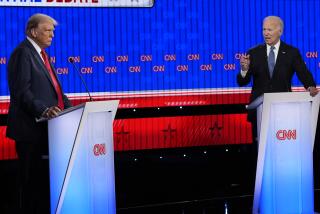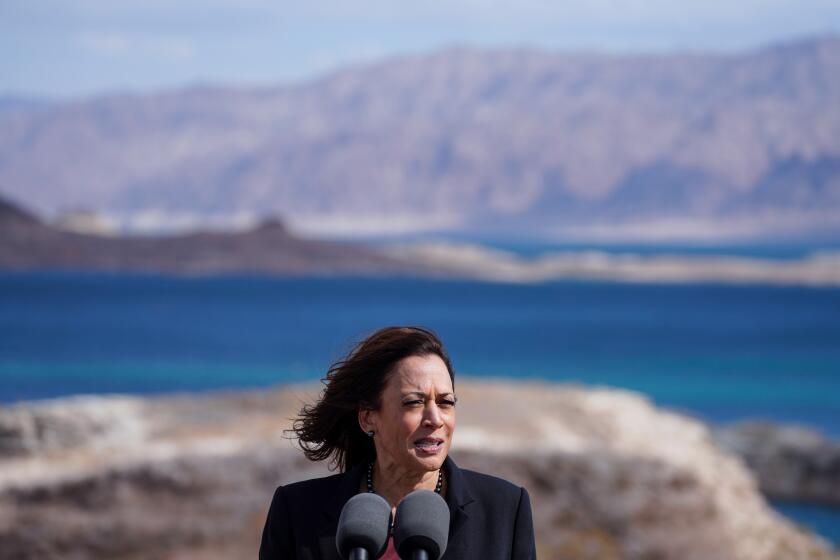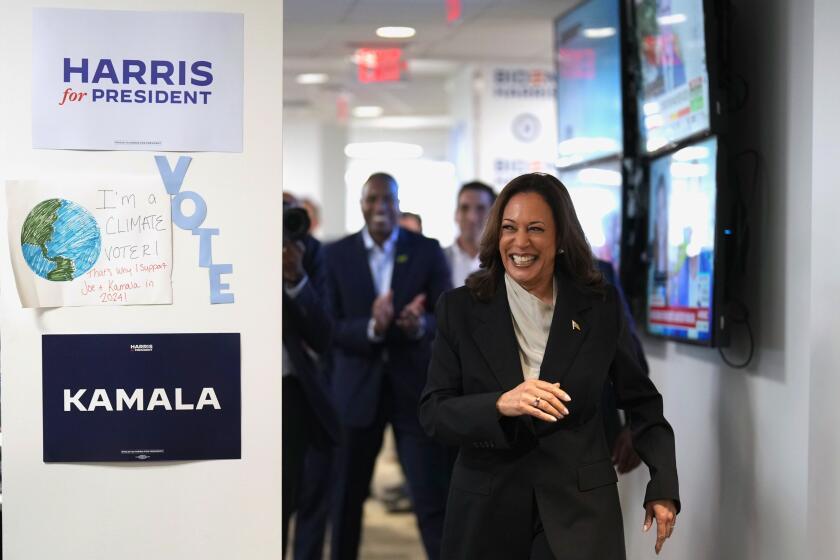Early Signs of BCCI Scandal Were Ignored
The scandal at the Bank of Credit & Commerce International has touched off a chain reaction of political recrimination and second-guessing on both sides of the Atlantic.
At the core of the debate in Washington and London is this question: Why did political leaders ignore numerous early warning signs that BCCI was involved in a massive illegal enterprise that defrauded depositors, laundered drug money, smuggled weapons and assisted such notorious outlaws as international terrorist Abu Nidal?
Sen. John Kerry (D-Mass.), whose Senate Foreign Relations subcommittee has been tracking BCCI activities for several years, said officials in Britain and the United States had strong indications of the bank’s wrongdoings in the late 1970s.
“Red flags were present almost from the beginning,” Kerry said. “What is amazing and frustrating to me is that BCCI’s day of reckoning has been so long delayed.”
Not until early last month--more than a decade after banking regulators had good reason to suspect that something was amiss at the Luxembourg-based bank--did officials in Britain, the United States and other Western countries take steps to shut down BCCI. The delay clearly contributed to losses around the world estimated at more than $10 billion.
As the story has unfolded in recent days, it appears that at least three factors were at work that prevented government officials from fully investigating BCCI before this year:
* Although information about BCCI’s activities emerged during a variety of high-profile law enforcement investigations, such as the U.S. prosecution of Panamanian dictator Manuel A. Noriega, allegations against the bank were always considered secondary. In fact, some critics suspect that Western intelligence agencies wanted to keep BCCI open as a window on terrorist activity and as a conduit for their own covert transactions.
* BCCI founder Agha Hasan Abedi’s friendship with many respected political leaders, such as former President Jimmy Carter and former British Prime Minister Lord Callaghan--as well as the bank’s ability to employ the services of many prestigious, high-priced law firms--gave the bank the political muscle to squelch criminal investigations whenever they began. BCCI spent an estimated $35 million in legal fees to negotiate a plea bargain in one such case.
* Bureaucratic blundering and petty jealousies among government agencies prevented public officials from recognizing the true magnitude of BCCI’s questionable activities. Some documents alleging wrongdoing by BCCI never reached the right law enforcement officials.
As often happens with such scandals, the politicians are clearly searching for a scapegoat.
In Washington, Republicans are blaming such well-known Democrats as former Defense Secretary Clark M. Clifford and his partner, Robert Altman, for allegedly deceiving government regulators about BCCI. Democrats, meanwhile, insist that the fault lies with lackluster law enforcement by the Bush and Reagan administrations.
In London, Labor Party leader Neil Kinnock has charged that Prime Minister John Major, who as chancellor of the exchequer oversaw the Bank of England until November, was “utterly negligent” in failing to recognize the problems at BCCI. He said Major knew of grave irregularities at BCCI in early 1990.
But no matter who is to blame, there is little doubt that BCCI could have been shut down much earlier. Over the last 15 years, there were many times when government regulators and BCCI’s political allies ignored clear evidence of wrongdoing by the Abu Dhabi-owned bank.
As the record shows, this saga of lost opportunities began in the late 1970s, when officials of Bank of America, which owned part of BCCI, began selling its stake in the company.
Internal Bank of America documents, entered into evidence in a 1978 Securities and Exchange Commission case stemming from BCCI’s efforts to buy First American Bank of Washington, D.C., alleged that the foreign bank had made millions of dollars worth of risky loans to insiders.
A Pakistani government document made public during the 1978 SEC proceedings outlined how Abedi had funneled cash payments totaling more than $2 million to Prime Minister Zulfikar Ali Bhutto of Pakistan, Abedi’s native country.
Although no law enforcement agency looked into these charges, BCCI’s reputation was sufficiently tarnished that regulators in Britain and the United States resisted Abedi’s later efforts to expand his bank’s activities in those two countries.
In the late 1970s, the Bank of England refused to grant BCCI a full-service banking license because the bank’s officials would not produce financial records to explain how it had grown so rapidly in the United Kingdom. The SEC and the New York bank superintendent blocked BCCI’s first efforts to acquire a bank in the United States.
IBCA Banking Analysis Ltd., the private bank-rating agency in Britain, said it has known for a decade that BCCI has serious problems. IBCA did not rate BCCI because the bank refused to supply the confidential information it needed. But Robin Munro-Davis, IBCA’s executive director, said in 1989 that--based on what he knew at that time--he would give it a C or a D on the scale of A to E that IBCA uses to measure banking performance.
IBCA’s suspicions were widely shared for years in the British financial community. Munro-Davis said his agency received more inquiries about BCCI than about any other bank in the last decade.
Even when BCCI secretly began acquiring American banks through such nominees as Saudi businessman Gaith R. Pharaon in the late 1970s, federal officials strongly suspected that BCCI was behind the purchases. But no link could be found at the time.
In every contact with government officials, BCCI relied heavily on the high-powered legal assistance of such men as Clifford and Altman. Clifford became chairman of First American after it was acquired by BCCI; Altman became president. Both have denied knowing that BCCI had any link with First American.
By 1986, the CIA knew a great deal about BCCI’s illegal activities. But a CIA memo detailing allegations of illegal activity--apparently including money laundering, arms smuggling and the illegal ownership of First American--never reached the appropriate authorities at the Justice Department or the Federal Reserve Board, according to reliable sources.
Likewise, U.S. intelligence officials discovered a link between a BCCI branch in Europe and the terrorist activities of Abu Nidal in 1986, according to A. Peter Burleigh, coordinator for counterterrorism at the State Department. Law enforcement officials apparently were not informed of this discovery, either.
In May, 1987, an examination of the Miami BCCI office identified money-laundering activities, and the Internal Revenue Service was called in to investigate. By that time, the Senate Foreign Relations subcommittee on terrorism and narcotics also had stumbled upon evidence that Noriega had a $20-million BCCI account used to make political payoffs.
Questions about BCCI’s activities began to dog the bank’s political allies in the United States and Britain. Even then, Carter, who traveled to many Third World countries with Abedi and whose humanitarian foundation received $8 million from BCCI, was questioned by reporters about the propriety of his relationship with the bank.
Carter staunchly defended BCCI.
In October, 1988, the government’s money-laundering investigation culminated in the indictment in Tampa, Fla., of BCCI and a number of its employees. But the embarrassment that it caused to BCCI did not last long.
While agreeing to a $14-million fine, BCCI managed to negotiate a highly unusual plea bargain in which the government agreed that it would never charge the bank “with committing any other federal criminal offenses under investigation or known to the government at the time.”
The plea bargain not only halted any further federal investigation of BCCI, but it also apparently helped repair the soiled reputation of the bank. Some critics, such as Jack A. Blum, former investigator for Sen. Kerry’s subcommittee, began to suspect a cover-up by the Reagan Administration.
When prosecutors in Tampa failed to follow up on evidence provided by Blum of widespread corruption at BCCI, he took his information to Manhattan Dist. Atty. Robert Morgenthau, who launched an investigation.
Justice Department officials strongly deny charges that they squelched the BCCI investigation at that point. The CIA, while admitting that it legally used BCCI to funnel money to Third World countries, insists that it had nothing to cover up.
William von Raab, who was U.S. Customs commissioner at the time, believes that Administration officials chose not to pursue the BCCI case because they were afraid it would complicate the investigation of Noriega. At the time, President Reagan was under heavy political pressure to take action against the Panamanian dictator.
One investigator familiar with the case said he suspects the Reagan Administration feared that a continued investigation of BCCI would draw attention to the role that the bank played in the Iran-Contra affair. Among other transactions, Arab businessman Adnan Khashoggi used money deposited at BCCI to provide bridge financing for one of the secret arms sales to Iran.
Similar suspicions have surfaced in London.
Ghassan Ahmed Qassem, a former manager of one of BCCI’s London branches, has said he provided information between 1987 and 1990 to MI5, Britain’s security service, about Abu Nidal’s account at the bank. The $50-million account was opened at the bank in 1981, according to Qassem.
Paul Wilkinson, a terrorism specialist at St. Andrews University in Scotland, said he finds Qassem’s story “heartily depressing,” if true. He said authorities apparently chose not to arrest Nidal and his financial adviser, perhaps because they were blinded by their desire to collect more information through Qassem.
“Intelligence can never become an end in itself,” Wilkinson said. “The fact appears to be that this money was being used to buy arms for one of the most vicious organizations in the world.”
Morgenthau said he ran into resistance in the United States and Britain. In the United States, the Justice Department sought to impede his investigation, he said.
Morgenthau said he was invited to Britain in mid-1989 to discuss his BCCI investigation at a meeting of the British Commonwealth’s executive staff, but when he arrived, he learned that it had been stricken from the agenda.
“Somebody on behalf of BCCI had complained,” he said.
A long federal investigation of CenTrust Savings & Loan in Miami also appeared to bog down, Blum said. It has yet to produce any indictments. BCCI secretly owned 25% of the costly, failed CenTrust.
In the United States, a knowledgeable source close to the current federal investigation insists that the Justice Department was simply preoccupied with other matters.
“I don’t think they realized the magnitude of it,” he said. “It was just sort of a bureaucratic thing.”
Although the Fed received a few tips about BCCI’s wrongdoing in the late 1980s, it was not until early 1991 that it actually launched a serious investigation of the bank. The inquiry began in earnest shortly after Morgenthau told the Fed that none of the more than $1 billion that BCCI loaned to the Arab owners of First American had been repaid--evidence that BCCI was the illegal owner of the Washington bank.
According to Fed officials, the Bank of England seemed reluctant to move against BCCI as the evidence of wrongdoing mounted. Even after the Bank of England commissioned a Price Waterhouse report in March that led to the bank’s seizure on July 5, a European “college of regulators” overseeing BCCI continued to work on restructuring the bank.
But investigations in both countries have intensified in recent weeks. Last week, Morgenthau announced the indictment of BCCI officials, and the Fed has moved to disqualify them from future banking ventures in the United States. Grand juries in Washington, Miami, Tampa, Atlanta and New York City also are hearing evidence against bank officials.
Fritz reported from Washington and Havemann from London.
More to Read
Sign up for Essential California
The most important California stories and recommendations in your inbox every morning.
You may occasionally receive promotional content from the Los Angeles Times.






